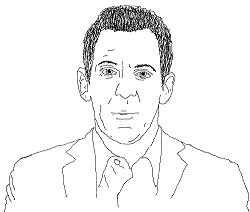The robots are (still) coming. Thanks to Jesus Olmo for this TED video of Sam Harris presenting what we could loosely say is a more sensible version of some Singularity arguments. He doesn’t require Moore’s Law to go on working, and he doesn’t need us to accept the idea of an exponential acceleration in AI self-development. He just thinks AI is bound to go on getting better; if it goes on getting better, at some stage it overtakes us; and eventually perhaps it gets to the point where we figure in its mighty projects about the way ants on some real estate feature in ours.
Getting better, overtaking us; better at what? One weakness of Harris’ case is that he talks just about intelligence, as though that single quality were an unproblematic universal yardstick for both AI and human achievement. Really though, I think we’re talking about three quite radically different things.
First, there’s computation; the capacity, roughly speaking, to move numbers around according to rules. There can be no doubt that computers keep getting faster at doing this; the question is whether it matters. One of Harris’ arguments is that computers go millions of times faster than the brain so that a thinking AI will have the equivalent of thousands of years of thinking time while the humans are still getting comfy in their chairs. No-one who has used a word processor and a spreadsheet for the last twenty years will find this at all plausible: the machines we’re using now are so much more powerful than the ones we started with that the comparison defeats metaphor, but we still sit around waiting for them to finish. OK, it’s true that for many tasks that are computationally straightforward – balancing an inherently unstable plane with minute control adjustments, perhaps – computers are so fast they can do things far beyond our range. But to assume that thinking about problems in a human sort of way is a task that scales with speed of computation just begs the question. How fast are neurons? We don’t really understand them well enough to say. It’s quite possible they are in some sense fast enough to get close to a natural optimum. Maybe we should make a robot that runs a million times faster than a cheetah first and then come back to the brain.
The second quality we’re dealing with is inventiveness; whatever capacity it is that allows us to keep on designing better machines. I doubt this is really a single capacity; in some ways I’m not sure it’s a capacity at all. For one thing, to devise the next great idea you have to be on the right page. Darwin and Wallace both came up with the survival of the fittest because both had been exposed to theories of evolution, both had studied the profusion of species in tropical environments, and both had read Malthus. You cannot devise a brilliant new chip design if you have no idea how the old chips worked. Second, the technology has to be available. Hero of Alexandria could design a steam engine, but without the metallurgy to make strong boilers, he couldn’t have gone anywhere with the idea. The basic concept of television was around since films and telegraph came together in someone’s mind, but it took a series of distinct advances in technology to make it feasible. In short, there is a certain order in these things; you do need a certain quality of originality, but again it’s plausible that humans already have enough for something like maximum progress, given the right conditions. Of course so far as AI is concerned, there are few signs of any genuinely original thought being achieved to date, and every possibility that mere computation is not enough.
Third is the quality of agency. If AIs are going to take over, they need desires, plans, and intentions. My perception is that we’re still at zero on this; we have no idea how it works and existing AIs do nothing better than an imitation of agency (often still a poor one). Even supposing eventual success, this is not a field in which AI can overtake us; you either are or are not an agent; there’s no such thing as hyper-agency or being a million times more responsible for your actions.
So the progress of AI with computationally tractable tasks gives no particular reason to think humans are being overtaken generally, or are ever likely to be in certain important respects. But that’s only part of the argument. A point that may be more important is simply that the the three capacities are detachable. So there is no reason to think that an AI with agency automatically has blistering computational speed, or original imagination beyond human capacity. If those things can be achieved by slave machines that lack agency, then they are just as readily available to human beings as to the malevolent AIs, so the rebel bots have no natural advantage over any of us.
I might be biased over this because I’ve been impatient with the corny ‘robots take over’ plot line since I was an Asimov-loving teenager. I think in some minds (not Harris’s) these concerns are literal proxies for a deeper and more metaphorical worry that admiring machines might lead us to think of ourselves as mechanical in ways that affect our treatment of human beings. So the robots might sort of take over our thinking even if they don’t literally march around zapping us with ray guns.
Concerns like this are not altogether unjustified, but they rest on the idea that our personhood and agency will eventually be reduced to computation. Perhaps when we eventually come to understand them better, that understanding will actually tell us something quite different?

